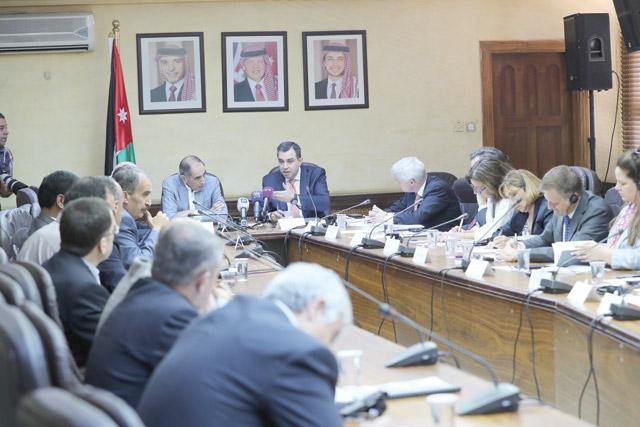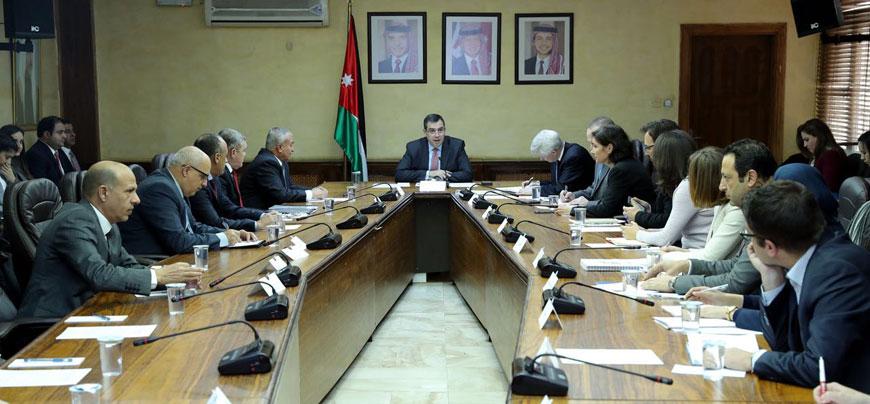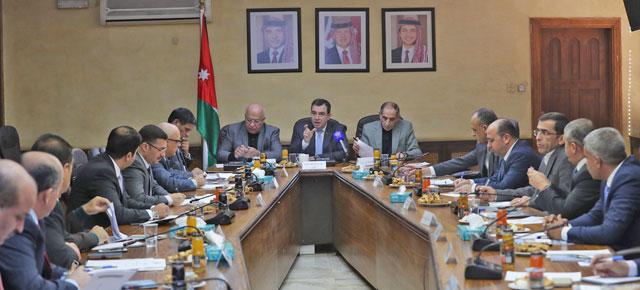You are here
Ministerial panel meets with donors to coordinate post-polls assistance
By JT - Jul 09,2017 - Last updated at Jul 09,2017

Planning and International Cooperation Minister Imad Fakhoury chairs a coordination meeting of the Ministerial Committee for Decentralisation with donors in Amman on Saturday (Photo courtesy of Planning and International Cooperation Ministry)
AMMAN — Planning and International Cooperation Minister Imad Fakhoury on Saturday held a coordination meeting of the Ministerial Committee for Decentralisation with donors to support the decentralisation project as the country heads for local elections on August 15.
Interior Minister Ghaleb Zu’bi, Municipal Affairs Minister Walid Masri, Political and Parliamentary Affairs Minister Musa Maaytah, secretaries general of various ministries, ambassadors of donor countries, and representatives of other concerned bodies took part in the meeting, a ministry statement said.
In the statement, Fakhoury said that the meeting aimed to coordinate with donors technical and financial support to ensure the success of the decentralisation experience, which is a major component of the political reform process.
He added that the committee briefed the donors’ representatives on all of the requirements needed after the completion of the elections to enable the elected councils and local governments to carry out their tasks.
Fakhoury noted the importance of supporting the development units at the municipalities and the local councils.
The attendees agreed to form a coordination committee from the concerned secretaries general that will hold periodical meetings with donors, and conduct surveys on technical support programmes that have been or will be launched to measure their compatibility with the needs in various fields, said the statement, adding that the committee will make sure that all needs were covered and benefits are sustainable.
For his part, Interior Minister Ghaleb Zu’bi said that people’s participation in the decision-making process is an important issue, adding that the Jordanian decentralisation project is unrivalled in the Arab world, in terms of the management of public affairs in the state, engagement of women and men in the process and the creation of new leaders in the local community.
“We look forward to working closely with donor countries and international organisations in the next few weeks to design and adopt a coordinated intervention that includes all the valuable support of donors in an integrated, methodologically oriented approach that promotes complementarities and eliminates the potential for duplication,” said Fakhoury.
The minister stressed that the endorsement and adoption of the laws of decentralisation and municipalities for the year 2015 came at a time of increasing momentum for democratic reform, where His Majesty King Abdullah, in his speech to Parliament on November 15, 2015, announced that the new legal framework of decentralisation will contribute to increasing the size of popular participation in decision making.
“We believe that municipal and decentralisation laws are fundamental pillars for expanding the powers of the local administrations in the governorates, deepening the participation of citizens, enabling them to contribute to their priorities and creating a future vision for the development path in their regions”, ensuring fair distribution of development, the minister noted.
Fakhoury added that decentralisation is one of the priorities of the government’s plan of action and is in line with the objectives of the Jordan 2025 document, the Executive Development Programme 2016-2019, the requirements of achieving the 2030 sustainable development agenda and the provincial development programmes 2017-2019.
He added that, to institutionalise action, the Ministerial Committee for Decentralisation has set up seven specialised subcommittees to implement the decentralisation project, including ones concerned with legislation, institutional and organisational structures, manuals and procedures, institutional capacities, the financial affairs, the domestic development and services, awareness and ICT.
The ministerial committee, Fakhoury said, has completed and obtained the Cabinet’s endorsement of several tasks entrusted to it, including the executive framework of decentralisation which represents the government’s action plan, the by-laws of provincial councils and the rules governing the distribution of constituencies and their seats.
The ministry will work on providing technical and logistic support and on attracting international expertise for the decentralisation project, the planning minister said.
For his part, Maaytah stressed the importance of enabling the elected councils to play their role during the next phase, underlining the importance of providing the local bodies with the necessary technical support.
Municipal Affairs Minister Walid Masri said that his ministry has prepared a comprehensive plan for training programmes on related legislation, problem solving and better service provision.
The donors, for their part, stressed their support for the ministerial plan, which has pinpointed the type of assistance elected provincial councils and other local bodies need to have the mission accomplished.
Related Articles
AMMAN — The Ministry of Planning and International Cooperation, with the support of the United Nations Development Programme (UNDP), on Mond
AMMAN — Planning and International Cooperation Ministry on Tuesday hosted a meeting of the Ministerial Committee on Decentralisation chaired
AMMAN – Interior Minister Salameh Hammad on Tuesday chaired a meeting to discuss the executive framework of the Decentralisation Law, the Jo













